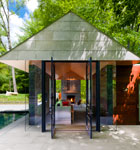At a Glance
Locations
Woodbridge, VA, and Wilmington, NC
Founded
1994
Employees
70–100
Specialty
Collaborative solutions
Growth in 2011
7%
There are many upsides to building in the federal sector, and Rich Karabin quips that one of the biggest advantages is how quickly he gets paid. As construction division general manager of Futron Incorporated, when Karabin issues an invoice to the US government, there’s a check on his desk 15 days later. A downside, however, is that when the economy hit a rough spot, nearly every company thought it was cut out to pursue contracts backed by federal funding. However, as Karabin points out, government work is a much more demanding animal than most builders think.
“Putting a wall up is putting a wall up, but with commercial work you have the luxury of having outside inspectors and consultants to verify your work to make sure everything has been done correctly,” Karabin says. “In the federal sector, we are responsible for completing the construction and inspecting our own work. This results in a unique challenge for our project teams. I may be biased, but in the federal sector we have to work harder and work smarter, and those are things that companies in the commercial sector aren’t necessarily used to.”
Futron has little to worry about when it comes to staying ahead of the curve. Most of its competitors are strictly construction, but Futron comprises three divisions: design-build construction, IT, and physical security. In 1994, when the company first started with the intention of working in the government sector, it only offered IT services. But a client who appreciated the company’s work requested that it take care of the construction side of a project, too, and things quickly took off from there. In 1995, Futron hired Karabin, who’d been working in Manhattan and getting familiar with different aspects of the construction business. He was brought on with the express goal of growing the design-build side of the company, and by all accounts he’s been incredibly successful.
“The best thing about having a multidiscipline approach is that if I run into a problem in an area I’m not familiar with, I can consult with an expert in our company and get the feedback I need,” Karabin says. “It offers owners a collaborative solution. Construction and IT installations are usually two separate contracts, but we’re offering both services in one contract, and that minimizes cost by expediting the process.”
Operating as an all-in-one provider has been helpful in getting the company challenging work in Iraq, including Futron’s first ever project in the country in 2005, the Design Build AIT Facility. At the time, IEDs were becoming commonplace, and the US Marine Corps needed an emergency facility where it could upgrade its Humvees. In just four months, Futron constructed two 70’ x 100’ structures that, according to Karabin, operated as “glorified pit stops,” allowing the Marines to upgrade 100 vehicles a week.
Moving forward, Futron is focusing on creating sustainable, energy-efficient structures such as the Fort Bragg Volckmann Training Center, which, as of press time, the firm hoped to complete by April of 2012. Originally an old Black & Decker factory in Fayetteville, NC, the structure is undergoing a complete overhaul as Futron upgrades the building insulation, installs energy-efficient lighting, and incorporates environmental-control systems to reduce the operational cost of the facility.
“I’d like to think that all of our projects are representative of our best practices,” Karabin says. “No matter what the project entails, we form a true partnership with our clients, and we take as much work off their desk as we can. We try to make their job easier, and that’s what they remember the next time they have a project.” ABQ


